六年级英语句型转换 汇总
小学六年级英语期末复习 句型转换

句型转换1.I have some toy cars. (改为否定句)I toy cars.2. We have three lessons this afternoon? (对画线部分提问)do you have this afternoon?3. There are some art rooms in your school. (改为一般疑问句并作否定回答)arts rooms in your school?, .4. There are twenty-four computers in the computer room? (对画线部分提问)in the computer room?5. The library is on the ground floor. (对画线部分提问)the library?6. There is one dress on the bed. (对画线部分提问)_______ _______ on the bed?7. There is some water in the bowl. (改为否定句)There water in the bowl.8. Do you have an animal friend? (用she 改写,并作肯定回答)she an animal friend? Yes, she .9. It likes your fingers! (改为否定句)It your fingers!10. I have some animal friends. (改为否定句)I animal friends.11. It has a hard body. (改为一般疑问句)it a hard body?12. The rabbit has two long ears. (对画线部分提问)What the rabbit ?13. Dogs can swim well. (改为一般疑问句,并做否定回答)dogs well? No, _______ ________.14. Give it a cake. (改为同义句) a cake it.15. It’s time for dinner. (改为同义句) It’s time .16. There is a library in the school. (改为复数)There in the school.17. What a beautiful house it is! (写出同义句) the house is!18. Su Hai’s hobby is dancing. (改为同义句) Su Hai .19. My mother’s hobby’s watching TV. (对划线部分提问)hobby’s watching TV?20. Mike likes playing basketball and football. (对划线部分提问)Mike ?21. My aunt likes singing English songs. (改为一般疑问句)your aunt English songs?22. They like playing the piano. (对划线部分提问)they like ?23.I have a computer. (用Tom替换I) Tom a .24. What does your mother do? (用a nurse 来回答)She a .25. Is he a writer? (作否定回答) No, .26. I eat a lot of sweets. (同义句) I eat sweets.27. Give Bobby a cake. (改为同义句) Give a Bobby.28. My mother is a nurse. (对划线部分提问)What your mother ?29. There are three art rooms in our school. (对划线部分提问)art rooms there in school?30. His sister works in a car factory. (改为否定句)His sister in a car factory.31. Lily has a rabbit. (改为一般疑问句)Lily a rabbit?32. My mother likes singing. My sister likes singing, too. (合并为一句)My mother and my sister singing.33. My sister is 12 years old. (对划线部分提问)is sister?34. Liu Tao is my good friend. (对划线部分提问)is good friend?35. Mike likes English and Maths. (对划线部分提问)Mike ?36. The boy in the tree is David. (对划线部分提问)37. He can speak English. (改为一般疑问句)English?38. He lives in Canada. (改为一般疑问句并作否定回答)-- he in Canada? -- No, he .39. It has arms and legs.(改为否定句) It has ______ arms _____ legs.40. Mike studies Chinese at school. (改为否定句)Mike Chinese at school.41. They play football after school. (改一般疑问句并作肯定回答)-- they football after school?-- Yes, they .42. Nancy has dancing lessons every Saturday. (改为否定句)Nancy dancing lessons every Saturday.43. Would you like to fly kites in the park at weekends? (改为同义句)you kites in the park on and Sundays?44. 我总是在周末去拜访我的爷爷奶奶。
六年级英语句式转换30道

六年级英语句式转换30道1. She is a student. (改为一般疑问句)答案:Is she a student? 解析:陈述句变一般疑问句,将be 动词is 提到句首,其余不变。
2. They are playing football. (改为一般疑问句)答案:Are they playing football? 解析:陈述句变一般疑问句,将be 动词are 提到句首,其余不变。
3. I am happy. (改为一般疑问句)答案:Are you happy? 解析:陈述句变一般疑问句,第一人称I 要变为第二人称you,be 动词am 变为are 提到句首。
4. This is a book. (改为一般疑问句)答案:Is this a book? 解析:陈述句变一般疑问句,将be 动词is 提到句首,其余不变。
5. Those are apples. (改为一般疑问句)答案:Are those apples? 解析:陈述句变一般疑问句,将be 动词are 提到句首,其余不变。
6. He likes music. (改为一般疑问句)答案:Does he like music? 解析:陈述句中没有be 动词,主语是第三人称单数he,借助助动词does 构成一般疑问句,likes 变回原形like。
7. We have lunch at school. (改为一般疑问句)答案:Do you have lunch at school? 解析:陈述句中没有be 动词,主语是we,变为一般疑问句时要变为you,借助助动词do 构成一般疑问句,have 形式不变。
8. They do their homework in the evening. (改为一般疑问句)答案:Do they do their homework in the evening? 解析:陈述句中没有be 动词,主语是they,借助助动词do 构成一般疑问句,do 的形式不变。
六年级英语句型转换方法归纳
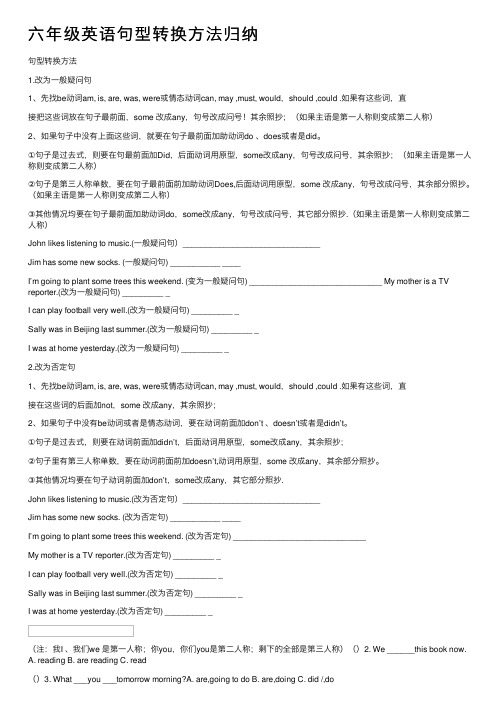
六年级英语句型转换⽅法归纳句型转换⽅法1.改为⼀般疑问句1、先找be动词am, is, are, was, were或情态动词can, may ,must, would,should ,could .如果有这些词,直接把这些词放在句⼦最前⾯,some 改成any,句号改成问号!其余照抄;(如果主语是第⼀⼈称则变成第⼆⼈称)2、如果句⼦中没有上⾯这些词,就要在句⼦最前⾯加助动词do 、does或者是did。
①句⼦是过去式,则要在句最前⾯加Did,后⾯动词⽤原型,some改成any,句号改成问号,其余照抄;(如果主语是第⼀⼈称则变成第⼆⼈称)②句⼦是第三⼈称单数,要在句⼦最前⾯前加助动词Does,后⾯动词⽤原型,some 改成any,句号改成问号,其余部分照抄。
(如果主语是第⼀⼈称则变成第⼆⼈称)③其他情况均要在句⼦最前⾯加助动词do,some改成any,句号改成问号,其它部分照抄.(如果主语是第⼀⼈称则变成第⼆⼈称)John likes listening to music.(⼀般疑问句)______________________________Jim has some new socks. (⼀般疑问句) ___________ ____I’m going to plant some trees this weekend. (变为⼀般疑问句) _____________________________ My mother is a TV reporter.(改为⼀般疑问句) _________ _I can play football very well.(改为⼀般疑问句) _________ _Sally was in Beijing last summer.(改为⼀般疑问句) _________ _I was at home yesterday.(改为⼀般疑问句) _________ _2.改为否定句1、先找be动词am, is, are, was, were或情态动词can, may ,must, would,should ,could .如果有这些词,直接在这些词的后⾯加not,some 改成any,其余照抄;2、如果句⼦中没有be动词或者是情态动词,要在动词前⾯加don’t 、doesn’t或者是didn’t。
句型转换(小学六年级英语复习专用)
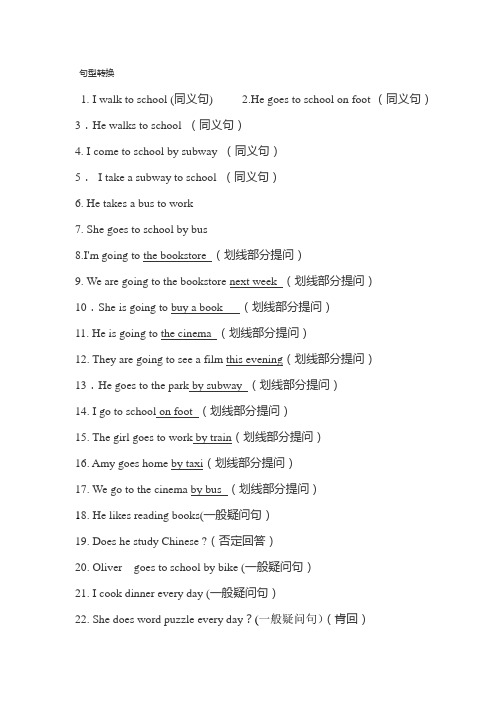
句型转换1. I walk to school (同义句)2.He goes to school on foot (同义句)3.He walks to school (同义句)4. I come to school by subway (同义句)5.I take a subway to school (同义句)6. He takes a bus to work7. She goes to school by bus18. He likes reading books(一般疑问句)19. Does he study Chinese ?(否定回答)20. Oliver goes to school by bike (一般疑问句)21. I cook dinner every day (一般疑问句)22. She does word puzzle every day?(一般疑问句)(肯回)23. Tom goes hiking every Sunday (一般疑问句)24. Do you live in China ?(否定回答)26. He has a interesting book (变为一般疑问句)27. I can help her (变为一般疑问句)28. There is a cinema (变为否定句)29. I‘m hungry (变为否定句)30. I want to send a card 变为否定句)31.There is a bookstore 变为复数句子)34. What does your father do?(同义句)35.What is she?(同义句)40 .I' m going to watch a movie this evening.(同义句)42 .I will go to the supermarket next weekend.(否)43. Is Jack going to visit his grandparents?(否答)44. She is going to draw some pictures , too.(否)60.What does he do?(同义句)67.Be late for school.(否定句)用所给单词的适当形式填空。
六年级句式转换知识点

六年级句式转换知识点一、肯定句变疑问句在将肯定句转换为疑问句时,需要改变句子的语序,即将动词放在主语之前。
例句1:肯定句:She is a teacher.疑问句:Is she a teacher?例句2:肯定句:They have finished their homework.疑问句:Have they finished their homework?二、一般疑问句的回答在回答一般疑问句时,我们可以使用"Yes, + 主语 + 动词原形"或者"No, + 主语 + 动词原形 + not"的形式。
例句1:一般疑问句:Does he like basketball?肯定回答:Yes, he likes basketball.否定回答:No, he does not like basketball.例句2:一般疑问句:Are they going to the park?肯定回答:Yes, they are going to the park.否定回答:No, they are not going to the park.三、选择疑问句的回答在回答选择疑问句时,我们需要根据实际情况选择"Yes"或者"No"来回答。
例句1:选择疑问句:Do you like apples or oranges?回答:I like apples.例句2:选择疑问句:Is he reading a book or watching TV?回答:He is reading a book.四、否定句变肯定句将否定句转换为肯定句时,我们需要将否定词改为肯定词。
例句1:否定句:She doesn't have a cat.肯定句:She has a cat.例句2:否定句:They aren't playing soccer.肯定句:They are playing soccer.五、比较句转换1. 比较级变原级在将比较级转换为原级时,我们需要去掉后面的比较对象,并保留原始的形容词或副词。
小学六年级上学期英语句型转换必考题型

小学六年级上学期英语句型转换必考题型班级:_____________ 姓名:_____________【句型转换】1. 句型转换。
[1]Can you help me?(做肯定回答)_____, I ______.[2]She is walking to school.(对句子主题意思提问)______ is she ______ _______?[3]He wants to get off the bus.(对句子主题意思提问)______ does he ______ to do?[4]She’s trying to stand up.(变为一般疑问句)_____ she _____ to stand up?[5]Will you help the little girl?(做否定回答)______, I ______.2. 句型转换。
[1]They are doctors. (改成单数句)[2]I lost my umbrella at the candy store. (就主题意思提问)[3]It''s eighy-two yuan. (对句子主题意思提问)[4]The king liked new clothes.(变为一般疑问句)[5]This is a big farm. (改为感叹句)3. 按要求写句子。
1. Amy goes to school by bus.(划线提问)_________ _________ Amy go to school?2. I go to the zoo on foot.(同义句转换)I ___________ __________ the zoo.3. It is a great robot.(改为感叹句)_________ ________ great robot!4. The museum is in front of the post office.(划线提问)___________ _________ the museum?5. There are some books on my desk.(变一般疑问句)________ _________ _________ books on your desk?4. 按要求改写句子。
小学六年级英语句型转换方法归纳大全
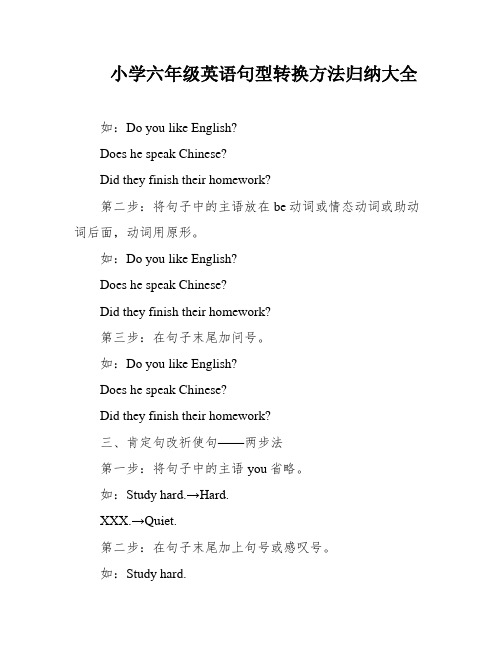
小学六年级英语句型转换方法归纳大全如:Do you like English?Does he speak Chinese?Did they finish their homework?第二步:将句子中的主语放在be动词或情态动词或助动词后面,动词用原形。
如:Do you like English?Does he speak Chinese?Did they finish their homework?第三步:在句子末尾加问号。
如:Do you like English?Does he speak Chinese?Did they finish their homework?三、肯定句改祈使句——两步法第一步:将句子中的主语you省略。
如:Study hard.→Hard.XXX.→Quiet.第二步:在句子末尾加上句号或感叹号。
如:Study hard.Be quiet!Original article:XXX and I went to the park yesterday。
We played catch and had a ic。
The weather was nice and sunny。
We saw some kids XXX。
We had a great time.Corrected and rewritten:XXX。
my friend and I went to the park。
We played catch and had a ic on the grass。
The weather was beautiful and sunny。
While we were there。
we saw some children flying kites and some people walking their dogs。
It was a wonderful day and we had a lot of fun.When forming a n in English。
六年级英语人教PEP版上学期句型转换汇集

六年级英语人教PEP版上学期句型转换汇集班级:_____________ 姓名:_____________1. 句型转换。
1. I have a stomachache. (就主题意思提问)2. 打扰了,书店在哪里? (汉译英)3. There were some horses on the farm. (改为否定句)4. Jenny had classes yesterday. (改为一般疑问句)5. Did Peter eat junk food yesterday? (做否定句回答)2. 句型转换。
1. It means you must wait on the pavement. (改为否定句)It _________ __________ you must wait on the pavement.2. I go to bed early. (改为同义句)I __________ go to bed ____________.3. She’ll get to the station by taxi. (对句子主题意思提问)___________ ___________ she get to the station?4. Mr Black saw many parrots in the park yesterdayafternoon. (对句子主题意思提问)__________ did Mr Black __________ many parrots in the park?5. I am going to the UK this summer holiday. (改为一般疑问句)__________ you ___________ to the UK this summer holiday?3. 句型转换。
[1]It means you can''t eat here.(就主题意思提问)[2]I am happy. (根据划线提问)________ ________ you ________?[3]It''s time for breakfast .(同义句)It''s time ________ ________ breakfast.[4]That is her knife.(改成复数)________ are ________ ________.[5]Are you going to buy a birthday cake? (作肯定回答)4. 按要求完成下列各题。
六年级英语句型转换及答案

六年级英语句型转换及答案在六年级的英语学习中,学生们需要掌握并运用多种英语句型进行表达。
句型转换是提高语言运用能力的重要一环,通过对原句进行改写,学生们可以更加灵活地运用所学的语法知识来表达自己的意思。
下面将详细介绍一些常见的六年级英语句型转换,并给出相应的答案。
1. 肯定句转否定句:将肯定句改为否定句时,通常需要在动词前加上否定词not。
例如:She is my friend. → She is not my friend.2. 否定句转肯定句:将否定句改为肯定句时,通常需要去掉否定词not。
例如:He doesn't like soccer. → He likes soccer.3. 一般疑问句转陈述句:将一般疑问句改为陈述句时,通常需要用肯定或否定回答中的一个来作为答句。
例如:Do you like ice cream? → Yes, I do. / No, I don't.4. 陈述句转特殊疑问句:将陈述句改为特殊疑问句时,通常需要将疑问词放在句首。
例如:You are from China. → Where are you from?5. 一般现在时转一般过去时:将一般现在时改为一般过去时时,通常需要将动词的过去式形式。
例如:She sings well. → She sang well.6. 一般过去时转一般将来时:将一般过去时改为一般将来时时,通常需要在动词前加助动词will。
例如:They visited the museum last week. → They will visit the museum next week.7. 现在进行时转一般现在时:将现在进行时改为一般现在时时,通常需要去掉be动词,并根据主语的单复数形式来决定动词的形式。
例如:I am reading a book. → I read a book.8. 一般现在时转现在进行时:将一般现在时改为现在进行时时,通常需要在动词前加上be动词,并将动词的原形变为-ing形式。
六年级练习题句型转换
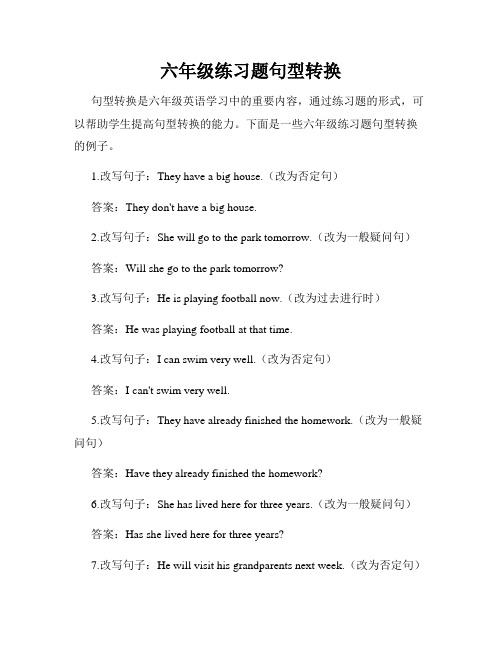
六年级练习题句型转换句型转换是六年级英语学习中的重要内容,通过练习题的形式,可以帮助学生提高句型转换的能力。
下面是一些六年级练习题句型转换的例子。
1.改写句子:They have a big house.(改为否定句)答案:They don't have a big house.2.改写句子:She will go to the park tomorrow.(改为一般疑问句)答案:Will she go to the park tomorrow?3.改写句子:He is playing football now.(改为过去进行时)答案:He was playing football at that time.4.改写句子:I can swim very well.(改为否定句)答案:I can't swim very well.5.改写句子:They have already finished the homework.(改为一般疑问句)答案:Have they already finished the homework?6.改写句子:She has lived here for three years.(改为一般疑问句)答案:Has she lived here for three years?7.改写句子:He will visit his grandparents next week.(改为否定句)答案:He won't visit his grandparents next week.8.改写句子:I bought a new book yesterday.(对划线部分提问)答案:When did you buy a new book?9.改写句子:He can speak English and French.(改为选择疑问句)答案:Can he speak English or French?10.改写句子:She lived in London for five years.(改为现在完成时)答案:She has lived in London for five years.以上是一些六年级练习题句型转换的例子,通过反复练习,学生能够更好地掌握不同句型的转换方式,提高语言表达的能力。
六年级上册英语句型转换专项复习

六年级上册英语句型转换专项复习班级:_____________ 姓名:_____________【句型转换】1. 句型转换。
[1]I played badminton last night.(改为一般疑问句)__________ you __________badminton last night?[2]Twenty years ago, I could buy things from shops. (变为否定句)[3]She lives in a small town near New York. (对句子主题意思提问)[4]She is a nurse. (改为否定句)[5]It''s a big building. (改为what引导的感叹句)2. 按要求完成句子。
[1]The boy is reading carefully.(对句子主题意思提问)________ ________ the boy ________ carefully?[2]He feels tired.(对句子主题意思提问)________ ________ he ________?[3]I go to school at 8:00.(对句子主题意思提问)[4]Four horses are running through the grass.(对句子主题意思提问)________ ________ ________ are running through the grass?[5]Mum woke Liu Tao up.(对句子主题意思提问)________ ________ Liu Tao ________?3. 按要求完成下列句子。
1. I do my homework every day. (改为一般疑问句,并作否定回答)—________ ________ ________ your homework every day?—________, ________ ________.2. She is always a good student. (改为一般疑问句,并作否定回答)—________ ________ always a good student?—________, ________ ________.4. 按要求完成句子。
六年级英语句型转换知识点

六年级英语句型转换知识点六年级英语句型转换知识点详解句型转换的基本原则•句型转换指的是将一种句型转变成另一种句型,通过更改句子的结构、时态、语态、人称等来达到转换的目的。
•在进行句型转换时,需要注意句子的语法规则,尤其是主谓一致、时态一致等。
一般现在时句型转换•肯定句转否定句:在句子前加上”do not”或”does not”,并改变动词原形。
•否定句转肯定句:去掉”do not”或”does not”,并改变动词原形。
•一般疑问句转陈述句:将疑问句中的疑问词替换为相应的信息。
•一般疑问句转否定句:在疑问句前加上”do not”或”does not”。
•陈述句转一般疑问句:在句首加上”Do”或”Does”。
•特殊疑问句转陈述句:将特殊疑问句中的疑问词替换为相应的信息。
•肯定句转否定句:在句子前加上”did not”,并改变动词原形。
•否定句转肯定句:去掉”did not”,并改变动词原形。
•一般疑问句转陈述句:将疑问句中的疑问词替换为相应的信息。
•一般疑问句转否定句:在疑问句前加上”did not”。
•陈述句转一般疑问句:在句首加上”Did”。
•特殊疑问句转陈述句:将特殊疑问句中的疑问词替换为相应的信息。
现在进行时句型转换•肯定句转否定句:在be动词后加上”not”。
•否定句转肯定句:去掉”not”。
•一般疑问句转陈述句:将疑问句中的疑问词替换为相应的信息。
•一般疑问句转否定句:在疑问句前加上”do not”或”does not”。
•陈述句转一般疑问句:将be动词提前至句首。
•特殊疑问句转陈述句:将特殊疑问句中的疑问词替换为相应的信息。
•肯定句转否定句:在句子前加上”will not”。
•否定句转肯定句:去掉”not”。
•一般疑问句转陈述句:将疑问句中的疑问词替换为相应的信息。
•一般疑问句转否定句:在疑问句前加上”will not”。
•陈述句转一般疑问句:在句首加上”Will”。
•特殊疑问句转陈述句:将特殊疑问句中的疑问词替换为相应的信息。
六年级英语句型转换
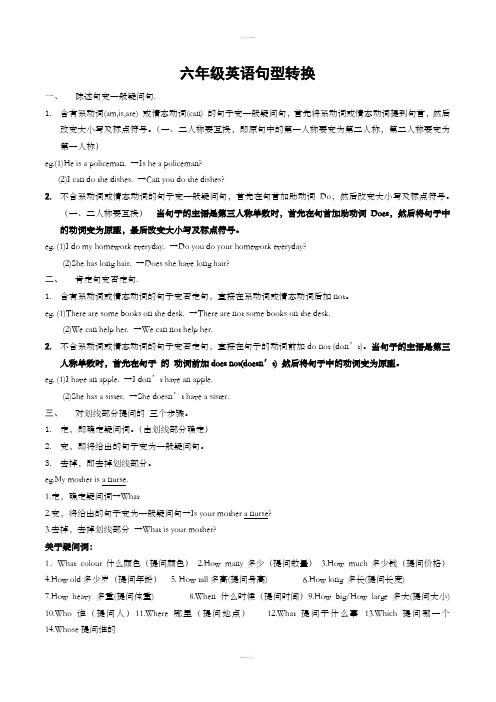
精品---六年级英语句型转换一、陈述句变一般疑问句.1.含有系动词(am,is,are) 或情态动词(can) 的句子变一般疑问句,首先将系动词或情态动词提到句首,然后改变大小写及标点符号。
(一、二人称要互换,即原句中的第一人称要变为第二人称,第二人称要变为第一人称)eg.(1)He is a policeman. →Is he a policeman?(2)I can do the dishes. →Can you do the dishes?2.不含系动词或情态动词的句子变一般疑问句,首先在句首加助动词Do,然后改变大小写及标点符号。
(一、二人称要互换)当句子的主语是第三人称单数时,首先在句首加助动词Does,然后将句子中的动词变为原型,最后改变大小写及标点符号。
eg. (1)I do my homework everyday. →Do you do your homework everyday?(2)She has long hair. →Does she have long hair?二、肯定句变否定句.1.含有系动词或情态动词的句子变否定句,直接在系动词或情态动词后加not。
eg. (1)There are some books on the desk. →There are not some books on the desk.(2)We can help her. →We can not help her.2.不含系动词或情态动词的句子变否定句,直接在句子的动词前加do not (don’t)。
当句子的主语是第三人称单数时,首先在句子的动词前加does not(doesn’t) 然后将句子中的动词变为原型。
eg. (1)I have an apple. →I don’t have an apple.(2)She has a sister. →She doesn’t have a sister.三、对划线部分提问的三个步骤。
六年级英语句型转换
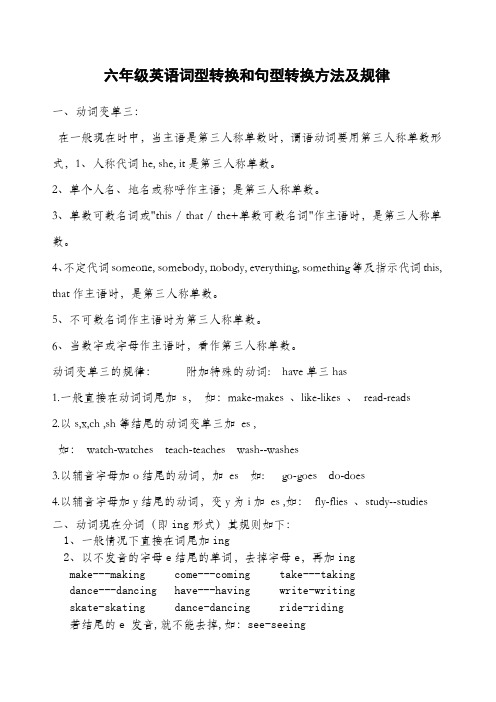
六年级英语词型转换和句型转换方法及规律一、动词变单三:在一般现在时中,当主语是第三人称单数时,谓语动词要用第三人称单数形式,1、人称代词he, she, it是第三人称单数。
2、单个人名、地名或称呼作主语;是第三人称单数。
3、单数可数名词或"this / that / the+单数可数名词"作主语时,是第三人称单数。
4、不定代词someone, somebody, nobody, everything, something等及指示代词this, that作主语时,是第三人称单数。
5、不可数名词作主语时为第三人称单数。
6、当数字或字母作主语时,看作第三人称单数。
动词变单三的规律:附加特殊的动词: have单三has1.一般直接在动词词尾加s,如:make-makes 、like-likes 、read-reads2.以s,x,ch ,sh等结尾的动词变单三加es ,如:watch-watches teach-teaches wash--washes3.以辅音字母加o结尾的动词,加es 如: go-goes do-does4.以辅音字母加y结尾的动词,变y为i加es ,如:fly-flies 、study--studies二、动词现在分词(即ing形式)其规则如下:1、一般情况下直接在词尾加ing2、以不发音的字母e结尾的单词,去掉字母e,再加ingmake---making come---coming take---takingdance---dancing have---having write-writingskate-skating dance-dancing ride-riding若结尾的e 发音,就不能去掉,如:see-seeing3、以重读闭音节结尾,呈现“辅,元,辅”结构的动词,先双写末尾的辅音字母,再加ingrun-running, swim-swimming, get – getting,sit–sitting, put–putting, begin–beginning(visit,listen重读在前 ,不是以重读闭音节结尾,不用双写,直接加ing)4、以ie结尾的动词,把ie改为y ,再加ingdie---dying lie---lying名词变复数规律:1.一般名词复数是在名词后面加上“s”2.以s, sh, ch, x等结尾的名词变复数加“es”,如bus→bus es, dish→dishes watch→watch es,box→box es,peach→peach es3.以辅音字母+y结尾的名词变复数,把y变i加es,如bab y→bab ies, countr y→countr ies,factory→factoriesdictionary→dictionaries, university→universitiessecretary →secretaries , librar y→librar ies,(以元音字母+ y结尾的名词变复数时,直接加s变复数,如monk e y→monkeys, holid a y→holiday s, b o y→boy s);4.以o 结尾的名词变复数时:a)常见加es的名词有:土豆potato→potato es; 西红柿tomato→tomato esb)常见加s的名词有:photo→photo s,piano→piano s,radio→radio s, zoo→zoo s5、以e结尾加s :shoe→ shoe s ; rule→ rule s, bike→bike s6.以f或fe结尾的名词变复数时:去掉f, fe 加ves的名词有:hal f→hal ves; kni fe→kni ves lea f→lea ves ; wi fe→wi vesli fe→li ves人称代词和物主代词:一、人称代词二、物主代词1.含有be动词(am, is, are) 或情态动词(can,may,must,should) 的句子变一般疑问句,首先将be动词或情态动词提到句首,然后改变大小写及标点符号。
牛津版英语六年级下册句型转换专项复习

牛津版英语六年级下册句型转换专项复习一、变一般疑问句。
1. They are playing baseball.Are they playing baseball?2. She is a doctor.Is she a doctor?3. We have a dog.Do we have a dog?4. He can swim very well.Can he swim very well?5. I like pizza.Do you like pizza?6. They will go to the park.Will they go to the park?二、变否定句。
1. The cat is sleeping.The cat is not sleeping.2. He likes ice cream.He does not like ice cream.3. We can swim in the lake. We cannot swim in the lake.4. She has a red dress.She does not have a red dress.5. They will arrive on time. They will not arrive on time.6. I am going to the library.I am not going to the library.三、变一般疑问句并作肯定、否定回答。
1. He is listening to music.Is he listening to music?Yes, he is. / No, he isn't.2. They have finished their homework. Have they finished their homework? Yes, they have. / No, they haven't.3. She can swim in the pool.Can she swim in the pool?Yes, she can. / No, she can't.4. We will arrive late.Will we arrive late?Yes, we will. / No, we won't.5. You like playing basketball.Do you like playing basketball?Yes, I do. / No, I don't.6. It is raining outside.Is it raining outside?Yes, it is. / No, it isn't.以上是牛津版英语六年级下册句型转换专项复的内容。
【知识归纳】英语六年级英语句型转换知识汇总

六年级句型转换知识汇总一、肯定句改否定句的方法1、在be动词后加not。
如:is not,are not,am not2、在can,should,will等后加not。
如:can not,should not,will not;3、上述都没有的,在动词前加助动词否定形式don’t/doesn’t/didn’t。
4、some改成any。
如:I am a girl.→I am not a girl.You are a student.→You are not a student.→You aren’t a student.This is Tom’s bag,→This is not Tom’s bag.→This isn’t Tom’s bag.二、肯定句改一般疑问句的方法1、把be动词放在句首,剩下的照抄,(some改成any,I改成you,my改成your)句点改成问号。
2、把can,shall,will等放到句首,剩下的照抄,(some改成any,I改成you,my改成your)句点改成问号。
3、上述都没有的,在句首请助动词Do/Does/Did帮忙,剩下的照抄,(some改成any,I改成you,my改成your)句点改成问号。
注意:句首的第一个字母要大写,句尾标点应为“?”。
如:I am in Class6.→Are you in Class6?You are from America.→Are you from America?It is an orange.→Is it an orange?4、就一般疑问句回答一般疑问句有两种回答,即:肯定回答和否定回答。
其中,肯定回答用yes,否定回答用no。
语句顺序为:Yes+主语+am/is/ are/was/were.|can.|do/does/did|;No+主语+am not/isn’t/aren’t 如:—Are you an English teacher?→Yes,I am./No,I am not.—Is that a bird?→Yes,it is./No,it isn’t.三、对划线部分提问“就划线部分提问”是小学阶段英语学习的难点,但是一旦掌握了规律,就变得容易多了。
- 1、下载文档前请自行甄别文档内容的完整性,平台不提供额外的编辑、内容补充、找答案等附加服务。
- 2、"仅部分预览"的文档,不可在线预览部分如存在完整性等问题,可反馈申请退款(可完整预览的文档不适用该条件!)。
- 3、如文档侵犯您的权益,请联系客服反馈,我们会尽快为您处理(人工客服工作时间:9:00-18:30)。
小学六年级英语句型转换汇总
1、This is my English book.(变成复数)
2、My father is an engineer. (对画线部分提问)
3、His football is on the bed. (对画线部分提问)
4、I do my homework on Sunday (改成否定句)
5、She is play basketball on the playground.(改为一般疑问句并做否定回答)
6、He can keep the book as long as you need. (对画线部分提问)
7、Which is the way to the office building?(写出同义句)
8、How old are you?(根据实际回答问题)
9、I ever saw a traveller.(改为一般疑问句)
10、He came here by plane.(对划线部分提问)
11、She is from France(对划线部分提问)
12、Tt is my first time to Xi’an. (改成否定句)
13、The weather was OK. (改为一般疑问句)
14、My trip to Xi’an was great. (对画线部分提问)
15、We can see beautiful flowers in the park. (改为一般疑问句并做肯定回答)
16、I can see green trees in the picture. (对划线部分提问)
17、Was the weather bad?(做出否定回答)
18、I have some beautiful photos of the city. (改为一般疑问句)
19、The food is very delicious. (对划线部分提问)
20、Can they do a lot of work for people? (做出否定回答)
21、They are pandas. They look lovely.(合并为一句)
22、There are some elephants and lions here. (改为一般疑问句)
23、Pandas come from China. (对划线部分提问)
24、We see many animals in the zoo. (对划线部分提问)
25、This is the first time I come to xi’an. (写出同义句)
26、We’re going to take some pictures. (对划线部分提问)
27、place , I, interest, of, visited, there, many.(连词成句)
28、Alice will come to our home tomorrow. (改为一般疑问句)
29、I hope you will enjoy yourself here.(翻译成汉语)。
